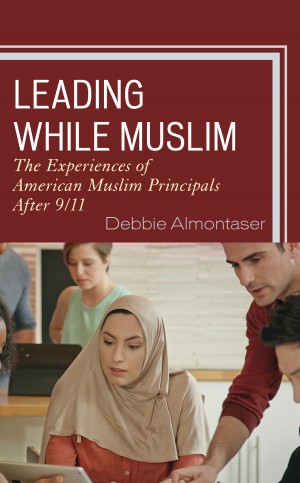Leading While Muslim: Destroying Stereotypes to Build More Inclusive Teams

Editor’s note: Diversity and inclusion are hot topics in HR and recruiting circles today, and for good reason: More diverse teams are shown to perform better than their less diverse counterparts.
However, many organizations still struggle to implement successful diversity and inclusion initiatives. These programs fail for a number of reasons, but chief among them may be unconscious biases. We all, to some degree, hold in our heads harmful, inaccurate stereotypes about people who are different from us. Despite our best intentions to banish those stereotypes, they can cloud our judgment, leading to bad recruiting decisions, a lack of team cohesion, and ineffective inclusion efforts.
In her new book, Leading While Muslim: The Experience of American Muslim Principals After 9/11, Dr. Debbie Almontaser explores the results of a study she conducted of American Muslim principals. By directly interviewing principals and reviewing studies of the experiences of other religious minorities, Almontaser paints a comprehensive portrait of the challenges Muslim leaders often run into in their personal and professional lives. More importantly, Almontaser also offers insight into how these obstacles can be overcome.
In this excerpt from Leading While Muslim, Almontaser traces the ways in which small, human-to-human interactions can foster greater understanding between people from different backgrounds. This kind of understanding is crucial for any successful, genuine diversity and inclusion effort. While Almontaser’s study may focus specifically on the experiences of professional educators, the conclusions she draws are equally valid for leaders in any business environment.
—
Living and working in a post-9/11 world against the backdrop of political spectacle has its challenges for American Muslim leaders. There are times, however, when human interactions can break through the political spectacle. These interactions can change the initial impression non-Muslims have for Muslims.
The participants in this study discuss the serendipitous dialogues with non-Muslim individuals that left these individuals with a positive impression of Muslims. Spiritually, Muslims are obligated to build bridges between themselves and other communities, as drawn from a verse in the “Dwellings” chapter in the Quran: “Oh mankind, indeed we have created you from a male and female and made you peoples and tribes so that you may know one another” (49:13). Inspired by this calling, American Muslims welcome opportunities to personally engage with non-Muslims as a part of their faith. Through this act, participants were able to break down the Islamophobic frames of political spectacle, which have shaped the way most people view American Muslims post-9/11.

Another participant, Lana, described a “humanizing” experience at a state education conference. She felt that, initially, she was being judged for wearing a hijab while offering a presentation on education policy. When she presented her speech and later interacted with session participants, it became clear to her that she had defied the stereotype of the uneducated submissive Muslim woman in the minds of the audience. Lana described feeling the tension in the room dissipating and feeling camaraderie between her education colleagues and herself; one even asked whether he could bring members of his district to visit her school.
Najla shared an incident in which the city teacher’s union representative visited her school regarding a grievance concerning Najla filed by the teachers. Najla recalled:
“I remember crying, and I said to her, ‘You know, I just know that Allah is going to take care of me.’ We talked about faith, and [she asked], ‘Do you believe in God?’ I was like, ‘Yeah, absolutely.’ That’s when I opened up about Islam and who I am. She said that, ‘What we learn is that we turn to God in our time of need, and this is going to be okay. You have to remember how God loves and how we have to believe that people are good.’ So we had this really deep conversation about Islam and Christianity and how they overlap and how with both of them it comes down to people first, loving people first, and how compassion moved the way people thought and everything through talking and being nice. And so we shared our different backgrounds and similarities between our two religions. For me, it was the start of a deep relationship, a lasting relationship between Jamie and I, that even now, she comes to me, and we just have these really deep conversations about life.”
Najla essentially humanized Islam and Muslims in this instance and described this interaction as a bond that changed their relationship. She also recounted a televised interview in regard to the FBI’s arrest of a Muslim. The non-Muslim man who was interviewed about Muslims explained that he had grown up with Muslims and found them to be kind, loving people, thus humanizing Muslims to the public:
“Most recently, the FBI made an arrest of an ISIS suspect, and a news reporter asked a young non-Muslim, non-Arab man if he was fearful of his neighbors who are Muslims. He stated, ‘No. I know them. I grew up with them. They are kind, loving people.’ The reporter asked, ‘Do you think the neighborhood’s reaction will be similar to 9/11?’ He said, ‘The neighborhood didn’t react negatively in 2001 because we know that Islam doesn’t promote violence. People in other communities reacted the way they did because they were fearful because they don’t know Islam or Muslims like we do.”
Excerpted fromLeading While Muslim: The Experience of American Muslim Principals After 9/11 , Dr. Debbie Almontaser, Rowman and Littlefield, 2019.
Dr. Debbie Almontaser is the founder and CEO of Bridging Cultures Group, Inc., and a Professor at the College of Staten Island’s School of Education in the Post Master’s Advanced Certificate Program for Leadership in Education.

